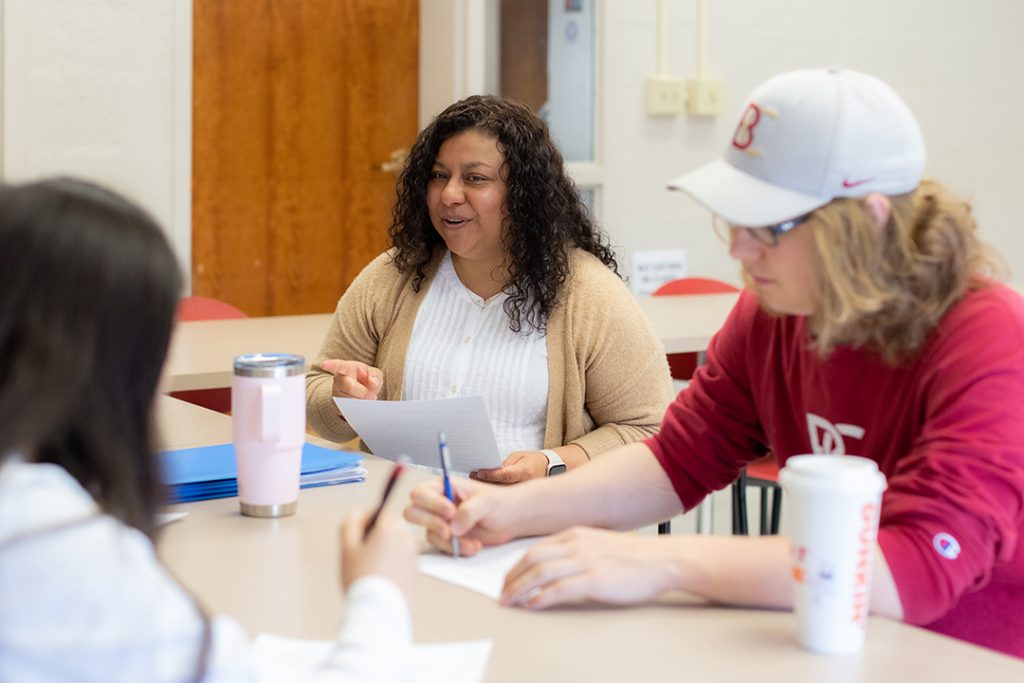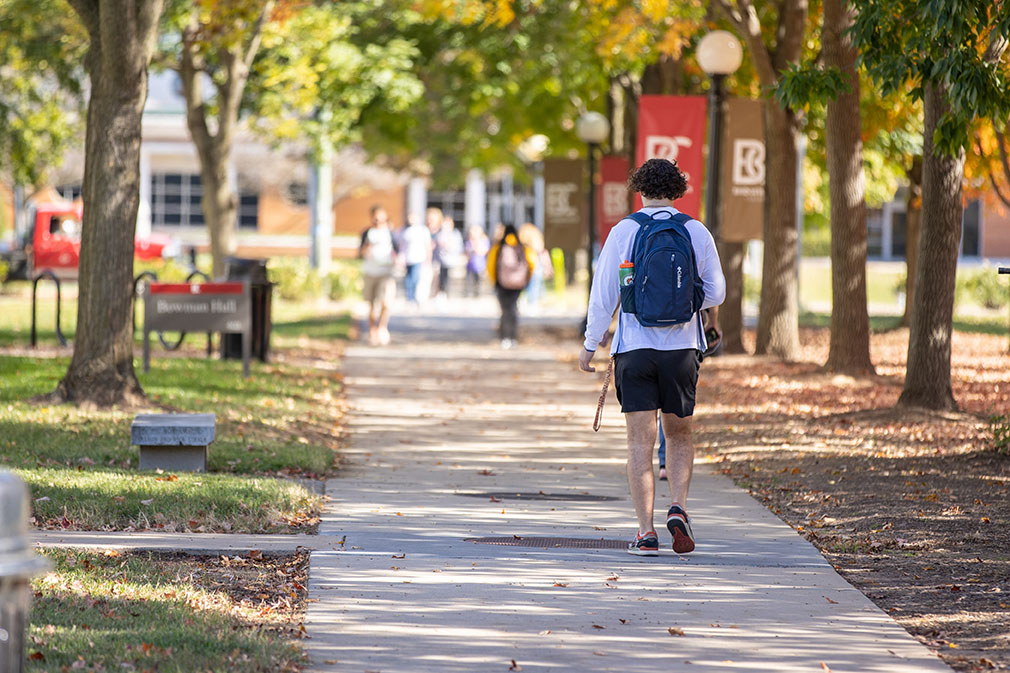Bridgewater College is committed to upholding the rights of students under the Americans with Disabilities Act (ADA). The Office of Academic Support and Disability Services exists in part to assist students in this regard.
Bridgewater College provides reasonable and appropriate accommodations to enrolled students with a disability to ensure equal access to the academic programs and College-administered activities according to The Americans with Disabilities Act and Section 504, as amended.
A student with a disability is defined as one who: (i) has a physical or mental impairment that substantially limits one or more major life activities, or (ii) has a history or record of such an impairment, or (iii) is perceived by others as having such an impairment. Physical or mental impairments may include but are not limited to: mobility/orthopedic impairments, visual impairments, hearing impairments, speech impairments, specific learning disabilities, attention deficit disorders/attention deficit hyperactivity disorders, psychological disabilities, neurological impairments, traumatic brain injuries, or chronic medical conditions such as cancer, diabetes or AIDS.
It is the responsibility of the student with a disability to identify themselves before receiving services by making application to the Office of Academic Support and Disability Services (ASDS).
Important things to know and review about Disability Services
- The difference between accommodations in high school and college
- Documentation Guidelines
- An Open Letter to Parents of Students with Disabilities About to Enter College
For more information about our autism support program, visit our BASE program overview page.
Academic, Housing or Dining Accommodations
To explore and seek academic, housing, or dining accommodations, students follow the outlined process below.
1) Complete an application
If you are new to our office or a new student, you must fill out an application. You may complete the application at any point once you have paid a deposit to the College. The registration process takes time. Therefore, all students are encouraged to register with Academic Support and Disability Services (ASDS) in a timely manner. Ideally, you should submit your request for services at least 4 weeks before the semester you will begin classes. Registering late in the semester can delay the implementation of your accommodations.
2) Submit documentation
If you have your documentation ready to attach, you can submit it in the application. Otherwise, if your documentation is not available, you can upload it after the consultation with the Academic Support and Disability Services (ASDS) Office. Documentation assists ASDS in determining the student’s eligibility as a qualified individual with a disability and establishing the necessary accommodations for the student to access services. Review the Documentation Guidelines.
3) Intake Interview
ASDS will reach out to you after receiving your application, directing you to schedule the intake interview. The purpose of the intake interview is to discuss with the Director of Academic Support and Disability Services the barriers to access encountered and the impact experienced (whether academic or life impact) related to your condition.
4) Eligibility
Once your eligibility status is established, ASDS will inform you in writing (via College email) as to the determination of the registration request generally within 14 business days of the interview and receipt of the necessary documentation. However, if other College staff (e.g., Academic Affairs, Health Services, Counseling Services, Residence Life) need to be involved in the review process, there may be a longer wait period.
5) Review and renew your accommodations each semester
Before the start of each semester, you will log in and review your accommodations for each class through an online system. Your specific accommodations are populated in a Faculty Notification Letter and sent to your professors by email for their acknowledgment. There is no need to submit documentation again unless there is a new diagnosis.
6) Discuss accommodations with faculty each semester
The student is required to discuss the implementation of the accommodations with their professors each semester. The conversation allows the student to receive the specific learning accommodations that are needed for each course. For example, if a student is eligible for extended time on examinations in a separate distraction-reduced environment, the professor and student would discuss the arrangements for taking examinations under these conditions. Faculty members are not required to provide examination accommodations to students who fail to discuss the implementation of the accommodation in a timely manner, as it may not be possible to make the necessary arrangements under such limitations; however, every effort will be made to assist students when possible.


Admitted and Current Students
Current students can obtain detailed information and application links on the Disability Services pages on myBC. Incoming students who paid their deposit can find detailed information in the “Welcome to BC Incoming Students” Canvas course.

BASE Program
The Bridgewater Academic and Social Experience (BASE) program is a student-centered, individual support program for students on the autism spectrum or other students who feel they may benefit from the support provided.
Additional Information
Responsibilities as a Student
- Disclose your disability to Academic Support and Disability Services (ASDS) in a timely manner when requesting academic accommodations
- Provide appropriate, current documentation supporting the disability
- Go to the instructor’s office hours or make an appointment with the instructor to facilitate privacy when requesting accommodations
- Initiate requests for specific accommodations in a timely manner
- Inform ASDS of the materials you need in alternate format as soon as possible
- Understand the attendance policy and attend classes. Contact your professor if illness or emergency prevents you from doing so
- Meet the academic requirements of your courses and major
- Assess the extent to which the accommodations agreed upon and implemented for the semester are meeting your access needs and share your feedback with ASDS
Academic Support and Disability Services (ASDS) Responsibilities
- Students registered with the ASDS are provided reasonable accommodations on a case-by-case basis to afford equal opportunity for each student’s participation in the College’s programs, activities, and services.
Academic Support and Disability Services (ASDS) Staff:
- expects students and faculty to work cooperatively with ASDS to facilitate academic accommodations
- denies academic accommodations/services if appropriate documentation has not been provided
- treats and protects all disability-related information as confidential medical information
- meets with the student privately in an accessible area
- provides appropriate accommodations
- provides print materials in an accessible format based on the student’s disability-related needs
- assists students with disabilities in understanding their strengths and functional limitations, and provides them with the skills to become self-advocates
Bridgewater College recognizes that due to a disability, some students may be unable to satisfy specific coursework requirements for degree completion. Therefore, qualified students with a disability may request the Office of Academic Support and Disability Services (ASDS) consider an appropriate course substitution. Clear and convincing documentation is needed to support the student’s request. Students must have completed an ASDS student accommodation application before submitting the course substitution request.
A modification, waiver, or substitution from a previous institution or high school does not guarantee approval at Bridgewater College. Students should submit their requests and documentation after their first semester and several semesters before they plan to graduate. Students who wait until their final semester(s) to begin this process should keep in mind that the review of their degree audit may be delayed while awaiting an evaluation. Additionally, academic advisors may not be able to make firm course recommendations for a student’s final semester(s) during this process.
Course substitutions will only be considered if the following conditions are met:
- The student would be unable to complete the required course, even with appropriate accommodations and academic supports in place
- Approving a substitution would not constitute a fundamental alteration to the academic program
- The course is not essential to the student’s major program of study or to meet licensure or certification requirements
- The course does not serve as a prerequisite to establishing a skill set required for other courses essential to the program of study or to meet licensure or certification requirements
A course substitution does not mean that the course is waived. The credit hours for the course(s) are met through alternate course(s).
For further information about course substitution due to a disability, contact disabilityservices@bridgewater.edu.
Student Dissatisfaction with the Determination of Academic Accommodations
If a student with a disability is not satisfied with the determination of accommodations, the student meets with the Director of Academic Support and Disability Services regarding this matter.
If the determination of accommodations is still unresolved, the student may appeal the decision in writing to the Assistant Dean for Academic Affairs. If the accommodation at issue is with respect to College housing, the student’s appeal shall be in writing to the Vice President for Student Life and Dean of Students or designee. The decision of the Assistant Dean for Academic Affairs or Vice President for Student Life and Dean of Students or designee, as the case may be, is final.
Student Dissatisfaction with the Implementation of Accommodations
If a student with a disability is not satisfied with the manner in which a faculty or staff member has implemented the determined accommodations, the student meets with the Director of Academic Support and Disability Services for assistance.
In these situations, the Director of Academic Support and Disability provides the student with assistance in explaining the protocol and determined accommodations to the faculty or staff member.
If the student’s dissatisfaction with the implementation of accommodations by a faculty or staff member is not resolved after consultation between the faculty or staff member and the Director of Academic Support and Disability Services, the student may appeal the decision in writing to the Assistant Dean for Academic Affairs. If the accommodation at issue is with respect to College housing, the student’s appeal shall be in writing to the Vice President for Student Life and Dean of Students or designee. The decision of the Assistant Dean for Academic Affairs or Vice President for Student Life and Dean of Students or designee, as the case may be, is final.
Student Dissatisfaction with the Modification of Course Requirements
If the request to modify course requirements fails to establish mutually acceptable modifications, the student may appeal in writing to the Assistant Dean for Academic Affairs. The decision of the Assistant Dean for Academic Affairs is final.
Student Dissatisfaction with the Determination of Housing Accommodations
A student may appeal the decision of the Housing Accommodation Review Board by submitting a written appeal to the Vice President for Student Life and Dean of Students or designee within ten (10) calendar days of the date of the decision from the Board.
To be considered, the appeal must include new and substantial information that was not available at the time of the Board’s decision and that would materially change the determination. The Vice President for Student Life and Dean of Students or designee will respond to the student within thirty (30) calendar days from receipt of the written appeal. This timeframe may be extended for good cause, which may exist if additional time is necessary to ensure the integrity and completeness of the review.
If the appeal is denied, the written decision will include a summary of the reasons the Vice President for Student Life and Dean of Students or designee reached their decision. The decision of the Vice President for Student Life and Dean of Students or designee is final.
Questions? Contact Us!
Academic Support and Disability Services
540-828-5660
disabilityservices@bridgewater.edu

